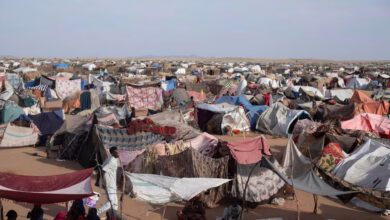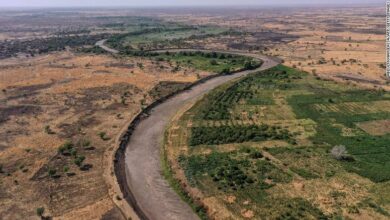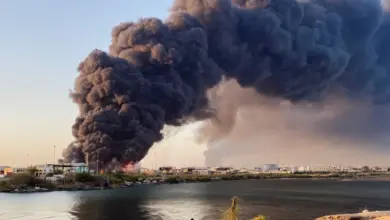Juba – South Sudan soldiers opened fire indiscriminately on men, women and even children after a battle with fighters belonging to their minority ethnic group, killing or wounding hundreds of civilians, according to witness accounts contained in confidential UN reports.
A UN team that traveled to the Nile River village 11 days after the 23 April killings saw more than two dozen corpses and said grass-roofed mud huts clearly contained many more bodies, but the toll of 254 dead civilians given by a local official has not been independently verified.
The three UN reports obtained by The Associated Press are the first accounts of mass civilian casualties in the southern village of Kaldak caused by soldiers from South Sudan. The reports are labeled "Confidential & Sensitive Information" and another "UN RESTRICTED" while the third has no apparent classification.
The Texas-sized south voted in January to secede from Sudan and becomes independent in July. It has been strongly supported by the US and other Western nations.
While the Khartoum-based Sudanese government has been vilified for carrying out genocide in Darfur and for invading Abyei – a central region contested by the north and south – last month, the reports obtained by AP raise serious questions about human rights abuses carried out by southern forces, known as the Sudan's People's Liberation Army, and about how much control their leaders have over them.
One survivor said the southern soldiers "shot at anything that was moving or standing" amid the riverside scrub brush.
The US has provided between US$150 million and US$300 million worth of "transformation initiatives" to the southern military, the Switzerland-based Small Arms Survey reported last year, including a training regime that focused on advising southern forces in operations, intelligence and communications.
It was not immediately clear if any of the southern soldiers involved in the 23 April killings in Jonglei state had been trained or equipped by the United States. The unit is commanded by Lt. Col. John Mama Korog, one of the UN field reports said. The No. 2 commander was identified as Maj. John Goang Galluak.
The southern military's spokesman, Col. Philip Aguer, told AP on Thursday that 165 people died in the battle, including 30 civilians. Mixed among fighters the SPLA battled were women and children, some of them armed, Aguer said. If civilians were killed it was in the crossfire, he said.
The UN team came by boat on 4 May to Kaldak, which is accessible only by river, to check for unexploded ordnance and learn about the clash between the SPLA and a former rebel group that had been supported by the north and was commanded by Maj. Gen. Gabriel Tanginye. The fighting had erupted over old ethnic and political rivalries.
Korog was at first "very defensive and refused to answer any questions," the UN patrol report noted, until the team explained they were supporting the SPLA and removing unexploded munitions.
From a distance, the UN team saw that the battlefield was marked by numerous bodies. Birds of prey circled overhead. The UN team reported that it was prevented from reaching the site by Korog who said it "would not be safe."
The team then walked into the civilian village, whose inhabitants were mostly members of the same ethnic Nuer group that most of Tanginye's fighters belonged to.
"As we entered the village it was obvious that most huts contained dead bodies. The swarm of flies and the stench provided clues to locate bodies," the unidentified author of the UN patrol report wrote. There, the UN members encountered a civilian administrator of the municipality who wanted to speak without the SPLA overhearing.
Moses Geyjang, the local official, said that once the battle outside the village ended the southern troops came to Kaldak and targeted civilians, who ran toward the Nile where many were shot, the UN report said. Geyjang said 254 residents had been killed. That number has not been verified by UN or US officials who did after-battle assessments.
When the U.N. official asked Geyjang where the rest of the bodies were buried, Geyjang said the military had dumped them into the river. Korog had previously told the U.N. team that it would see bodies washing up on shore, but Korog said these people had drowned while trying to flee across the river.
Geyjang told the UN team that southern military forces had looted the village, taking most of the residents' clothing. Even when the UN visited 11 days after the killings, the civilians appeared to be in dire straits
The report's author said he saw "civilians eating grass and leaves from trees."
"Unburied corpses, burnt houses, scattered food supplies were seen all over in the area of the visit," another UN report stated.
At a regional hospital in nearby Malakal, a 40-year-old woman told a UN human rights team that a southern soldier shot her 2-year-old in the head, killing the child instantly, as she ran with the toddler to the river. The woman was wounded in the back and leg.
A 38-year-old woman told UN investigators that she was shot at point-blank range by a soldier in the market. When asked why she thinks she was shot, she said that the southern forces didn't differentiate between men and women.
"The SPLA just shot at anything that was moving or standing," the woman said.
A male victim told the human rights team that southern commanders ordered their forces not to shoot civilians, but that many did so anyway.
"I saw many more dead bodies lying on the ground, many of them men and women who numbered more than 120 to 200 dead bodies on the banks of the White River Nile," said the 35-year-old man, who was shot in the left leg and back.
One photo taken in the weeks after the fighting showed a rotting corpse, with bones protruding, lying in a field next to a metal can marked "USA" in blue letters. That can is the type given out by the US Agency for International Development and often contains vegetable oil.
The southern military had wanted the surrender of Tanginye, a warlord sponsored by the north during the north-south civil war that ended with a peace agreement in 2005 that called for the south's independence referendum. And it wanted his men to integrate into the SPLA. But something went wrong with the integration attempt and it ended in gunfire.
A UN security assessment said the motives of the clash were tribal and political. Tanginye's force is predominantly from the Nuer community, while the majority of southerners are Dinka. The Nuer are an armed cattle-herding tribe that have had a long-running feud with the Dinka, and most southerners are against the integration of rebel groups, many of which are Nuer, into the military's ranks.
That long-running feud could explain why troops were reported to have disregarded orders from field commanders and targeted civilians, including women and children.
Gen. Jasbir Lidder, the second-highest official for the UN peacekeeping mission in Sudan, said in an interview that there were "heavy casualties" on both sides "and quite a few civilian casualties" in Kaldak.
An unclassified cable sent to Washington after a team from the US Consulate visited Kaldak said the evidence did not demonstrate a mass killing of noncombatants. Sixteen bodies were seen by the US team, including two adult females. The US officials visited 15 days after the battle. Because of security restrictions and a lack of time, the US officials did not see the entire battle site.
Antje Ruckstuhl, the head of the International Committee of the Red Cross in Southern Sudan, said the ICRC and the Sudanese Red Crescent Society were asked by government authorities to bury 18 corpses rotting in the sun on 11 and 12 May 11. "A few women and a few minors" – potentially including an infant child – were among them, she said.
Land mines delayed the ICRC from accessing the area to bury the remains, she said.
Aguer, the southern military's spokesman, noted the southern army had battled the north as a guerrilla force for decades and hasn't yet achieved 100 percent discipline.
"We are transforming the SPLA from a guerrilla to a conventional army and at the same time we are reorganizing in which we are accommodating people who have very little training, in discipline and in the army, so there is no doubt in between you can get incidents of indiscipline," he said. "It will take us some time."
A Western diplomat in Juba said top leaders order the troops to behave according to military law, but that a guerrilla mentality might still exist on the ground. The official spoke on condition of anonymity due to the sensitivity of the topic.
In a second recent incident involving the SPLA and a subclan of the Nuer, local officials accused the military of looting and burning Nuer huts, and a group of elders in Unity State wrote a letter to world leaders that said crimes against humanity were committed, including the burning of homes and the killing of civilians. No independent groups have confirmed the allegations, though Medicins Sans Frontiers treated gunshot victims afterward. Many SPLA members in Unity are also Nuer.
That fighting erupted 20 May in the western part of oil-rich Unity state when forces led by Peter Gadet attacked the SPLA-controlled village of Mankien.
Mayom County Commissioner Charles Machieng Kuol said by phone Thursday that 7,800 women and children were displaced and that civilian killings and displacement by the military is sometimes intentional.
Lidder, the UN official, confirmed a "heavy displacement of civilians and there are also killings, that's a fact."
Aguer said the Unity State allegations must be investigated and that the situation involves complicated tribal politics that must be sorted out.
Analysts say Southern Sudan must address its tribal tensions head-on or risk further conflict. The International Crisis Group said in a recent report that tribal violence threatens civilians and further polarization of ethnic groups.
"In recent months soldiers have committed serious abuses against civilians in the context of military operations against the rebels," said Jehanne Henry, Sudan researcher for Human Rights Watch. "The SPLA needs to take steps to ensure soldiers do not commit such abuses. They need to improve command and control over soldiers and…hold soldiers accountable for crimes committed against civilians."




